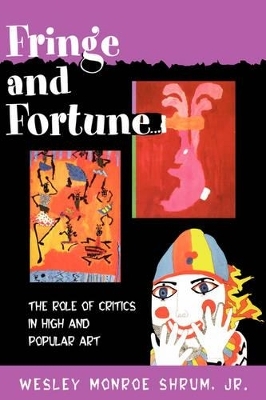
Fringe and Fortune
The Role of Critics in High and Popular Art
Seiten
1996
Princeton University Press (Verlag)
978-0-691-02657-2 (ISBN)
Princeton University Press (Verlag)
978-0-691-02657-2 (ISBN)
Focuses on the way individuals form opinions about culture through the mediation of critics. This book shows that it is the extent to which critics shape the reception of an art form that determines its place in the cultural hierarchy. It supports this argument through an inquiry into the performing arts, focusing on the Edinburgh Fringe.
Why does the distinction between high and popular art persist in spite of postmodernist predictions that it should vanish? Departing from the conventional view that such distinctions are class-related, Wesley Shrum concentrates instead on the way individuals form opinions about culture through the mediation of critics. He shows that it is the extent to which critics shape the reception of an art form that determines its place in the cultural hierarchy. Those who patronize "lowbrow" art--stand-up comedy, cabaret, movies, and popular music--do not heed critical opinions nearly as much as do those who patronize "highbrow" art--theater, opera, and classical music. Thus the role of critics is crucial to understanding the nature of cultural hierarchy and its persistence. Shrum supports his argument through an inquiry into the performing arts, focusing on the Edinburgh Fringe, the world's largest and most diverse art festival. Beginning with eighteenth-century London playhouses and print media, where performance art criticism flourished, Shrum examines the triangle of mediation involving critics, spectators, and performers.
The Fringe is shown to parallel modern art worlds, where choices proliferate along with the demand for guidance. Using interviews with critics and performers, analysis of audiences, and published reviews as well as dramatic vignettes, Shrum reveals the impact of critics on high art forms and explores the "status bargain" in which consumers are influenced by experts in return for prestige.
Why does the distinction between high and popular art persist in spite of postmodernist predictions that it should vanish? Departing from the conventional view that such distinctions are class-related, Wesley Shrum concentrates instead on the way individuals form opinions about culture through the mediation of critics. He shows that it is the extent to which critics shape the reception of an art form that determines its place in the cultural hierarchy. Those who patronize "lowbrow" art--stand-up comedy, cabaret, movies, and popular music--do not heed critical opinions nearly as much as do those who patronize "highbrow" art--theater, opera, and classical music. Thus the role of critics is crucial to understanding the nature of cultural hierarchy and its persistence. Shrum supports his argument through an inquiry into the performing arts, focusing on the Edinburgh Fringe, the world's largest and most diverse art festival. Beginning with eighteenth-century London playhouses and print media, where performance art criticism flourished, Shrum examines the triangle of mediation involving critics, spectators, and performers.
The Fringe is shown to parallel modern art worlds, where choices proliferate along with the demand for guidance. Using interviews with critics and performers, analysis of audiences, and published reviews as well as dramatic vignettes, Shrum reveals the impact of critics on high art forms and explores the "status bargain" in which consumers are influenced by experts in return for prestige.
Wesley Monroe Shrum, Jr., is Professor of Sociology at Louisiana State University.
List of IllustrationsList of TablesPrefaceIntroduction: A Critic's New Clothes3Ch. 1Cultural Mediation and the Status Bargain25Ch. 2Critics in the Performing Arts42Ch. 3Development of the Festival Fringe63Ch. 4Festivals and the Modern Fringe83Ch. 5Myth of the Fringe109Ch. 6Do Critics Matter?125Ch. 7Critical Evaluation144Ch. 8Do Performers Listen?165Ch. 9Beyond Formal Evaluation181Ch. 10Discourse and Hierarchy193Epilogue213Appendix A: Review Genres215Appendix B: Methodological Note218Appendix C: Note on the Mediation and Reception221Appendix D: Tables223Notes229Bibliography265Index275
| Erscheint lt. Verlag | 28.7.1996 |
|---|---|
| Zusatzinfo | 1 Maps |
| Verlagsort | New Jersey |
| Sprache | englisch |
| Maße | 197 x 254 mm |
| Gewicht | 425 g |
| Themenwelt | Kunst / Musik / Theater ► Kunstgeschichte / Kunststile |
| Kunst / Musik / Theater ► Musik | |
| Kunst / Musik / Theater ► Theater / Ballett | |
| Sachbuch/Ratgeber ► Sport ► Tanzen / Tanzsport | |
| ISBN-10 | 0-691-02657-2 / 0691026572 |
| ISBN-13 | 978-0-691-02657-2 / 9780691026572 |
| Zustand | Neuware |
| Haben Sie eine Frage zum Produkt? |
Mehr entdecken
aus dem Bereich
aus dem Bereich


